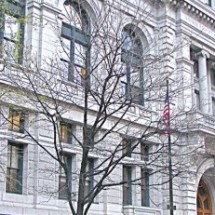Law Offices of John P. Connell, P.C.: In March 2017, the Appeals Court released its decision In Re: Quarterman vs. City of Springfield, wherein the Court upheld a verdict against the City of Springfield (“Springfield”) because its Liquor Licensing Board was found by a jury to have “retaliated” against a liquor license applicant where the Board refused to grant the applicant a liquor license.
In summary, in 2002, the plaintiff, who was an African American, opened a nightclub after being granted a liquor license from the Springfield Board of License Commissioners (“Board”). The business was running smoothly “until 2004, when a brawl and shooting occurred there during an afterhours party.” Thereafter, the plaintiff voluntarily closed the bar where eventually the business was closed permanently.
In August, 2004, the plaintiff and his business partner applied to the Board to transfer the nightclub liquor license to a new club called Halo that they had planned to open in the entertainment district of Springfield. The chairman of the Board (“Sygnator”) raised multiple concerns including, the interior design of the club, the proposed venue, which had previously been occupied by a nightclub called Asylum, which had caused issues for the city such as “large crows, excessive noise, vandalism, illegal drug use, and violence.” The Board then did not timely schedule a hearing on the transfer application – for more than 6 months.
In March 2, 2005, believing that the Board was not processing his application because of his race, the plaintiff filed a Complaint with the Massachusetts Commission Against Discrimination (“MCAD”) wherein he alleged that the city, the mayor, and Sygnator discriminated against him on the basis of race by failing to schedule a vote on his application to transfer the liquor license. Shortly after the MCAD filing, the Board did hold a hearing but voted to deny the liquor license transfer purportedly because of the Board’s concerns with the project. The Board recommended to the plaintiff and his partner that they apply for a new liquor license in the name of their new corporation which addressed the expressed concerns of the Board.
The plaintiff then filed for a new liquor license for the same location in 2006. This time, however, the Mayor of Springfield, who had never once appeared before the Board, requested the plaintiffs hearing be delayed so he could be in attendance. Then, not only did the Mayor attend, but he openly spoke out against the application, and recruited witnesses to also speak against the application. Once again, the board voted to deny the application.
Immediately after denying the plaintiff a liquor license, the Board, along with the mayor, approved a liquor license for a different nightclub in the same district where the plaintiff intended on opening his club. At that point, the plaintiff filed a second complaint with the MCAD, this time also alleging “retaliation” and then removed the complaint to Superior Court.
General Laws c. 151B, § 4(4), “makes it unlawful for any person…to …discriminate against any person because he has opposed any practices forbidden under this chapter or because he has filed a complaint.” Springfield’s position in the Superior Court was that there was insufficient evidence for the jury to conclude that the disapproval of a liquor license was caused by actions made by the mayor.
The Superior Court jury rejected the plaintiff’s claim of racial discrimination, but found that Springfield, through actions of the Mayor, had in fact “retaliated” against the plaintiff by denying the liquor license application. “The jury awarded damages of $250,000 in lost profits and $100,000 for emotional distress.” Springfield challenged the verdict in post-trial motions. The trial judge denied the post-trial motions of liability for retaliation, but allowed them in part, as to damages. “The judge found that the evidence of lost profits was “lacking in substance” and therefore reduced the damages to $100,000.”
Springfield appealed and the Appeals Court held that the jury could have found that the 2006 liquor license application addressed all the potential concerns the Board had during the initial hearing. “The capacity of the club had been decreased from 700 to 400, security had been increased, parking was added, and Quarterman’s role in the business had been reduced, the jury could have reasonably have concluded that, but for the mayor’s opposition, the application would have been approved.”
In summary, because the plaintiff filed an MCAD complaint against Springfield, the Appeals Court found that a jury could have reasonably found that the plaintiff suffered an adverse reaction in the denial of both the liquor license transfer and the new liquor license application. While this issue was an issue of fact to be determined by a jury, and even though the jury did not find that Springfield “discriminated” against the plaintiff based on race, the Appeals Court found that “retaliation” is a stand alone claim and a municipality can be found to be liable for its decision not to grant a liquor license even when such denials are common and are based on other stated reasons.
In other words, if a tier of fact argues that a plaintiff has proven a licensing board’s decision to deny a liquor license application was motivated by a municipality’s desire – or the desire of its officials – to retaliate against the applicant because the applicant had previously acted reasonably in response to perceived discrimination, the municipality can be held liable for the failed applicant’s damages.
(c) Law Offices of John P. Connell, P.C., April 2017
Submitted by Jacqueline Sparaco

